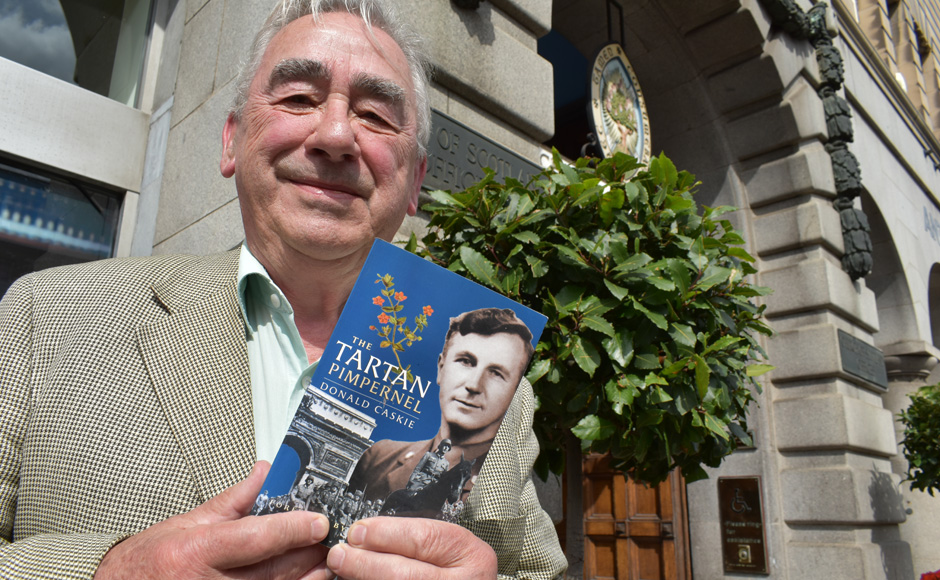Stage show 'homecoming' for Tartan Pimpernel
Published on 26 October 2018
A new play about a Church of Scotland minister who helped save more than 2,000 allied troops during the Second World War is being performed for the first time on the Hebridean island where he grew up.
Rev Dr Donald Caskie was known as the Tartan Pimpernel and his exploits will be brought to life in his home village of Bowmore on Islay on November 3.

Playwright John Hughes described the event as a "homecoming" for the war hero minister, who was leading the Scots Kirk in Paris when the Germans invaded France in 1940.
He said he was inspired to write about Dr Caskie's adventures after he learned that his Gaelic Bible had been returned to the church last year.
Gaelic to confuse the enemy
The three-man play, which is based on the minister's book, The Tartan Pimpernel, is being staged in Bowmore Hall.
Sponsored by the Islay Festival, eight members of the Caskie family will be in attendance and Bowmore distillery will provide people with a welcome dram.
Mr Hughes of Glasgow, said: "We wanted to take the play about the story of this forgotten Scottish minister back to his home town of Bowmore to celebrate his life on the island where he was born.
"This is where his character was formed sitting at the peat fire listening to his mother and attending Sunday school.
"It is the place where he first learned the French and Gaelic languages that would prove useful during the war."

The play, which stars Graeme Dallas as Dr Caskie, who was made an OBE in 1945 and honoured by the French Government, is currently on a mini tour of Scotland.
Dr Caskie's nephew, Tom Caskie, who gifted the leather bound Gaelic Bible to the Scots Kirk, said he was looking forward to the performance.
He said: "It is most fitting that the play should be staged in a hall that would have rung with laughter and music over a hundred years ago, as the young Donald first learned Scottish Country Dancing, just yards from his family home.
"The future war hero never lost his love of Scottish Country Dancing and now younger generations can learn of his exploits in a place that he had loved."

Mr Caskie of Edinburgh revealed that his uncle, who used the Bible when he worked in France, often used Gaelic to hide information that he did not want to fall into the hands of the enemy.
The minister denounced the Nazis from his pulpit and when the Germans invaded Paris he had to flee the city.
While in southern France, he refused the chance of safe passage on the last ship bound for the UK and fled to Marseille instead.
There he ran a Seaman's Mission, living a double life and passing the close scrutiny of the Vichy Police, and helped British and Allied soldiers to freedom across mountains into Spain.
He was eventually recruited by British Intelligence officers and was told that his mission was the last link of a chain of safe houses that they had set up, which stretched from the beaches of Dunkirk in northern France to Marseille in the south.
With nothing to trust but God and his instincts, the crofter's son operated in the Seaman's Mission for many months until he was betrayed by a traitor.

Dr Caskie, who is remembered for his humble yet joyful nature, was eventually arrested by the Vichy Police, interrogated and banished from Marseille.
He moved to Grenoble where he continued to arrange for the escape of soldiers, seamen and airmen under the cover of being a university chaplain.
Dr Caskie was finally imprisoned by the Gestapo and sentenced to death.
Patriotic
The minister, who was given his nickname by the BBC, had ignored repeated calls from British Intelligence and the Church of Scotland to return home.
His life was only saved through the intervention of a German pastor and he spent the rest of the war in a Prisoner of War camp.
The proceeds of the book penned by Edinburgh University graduate Dr Caskie, whose first charge was Gretna St Andrew's Church, helped rebuild the Scots Kirk.
Church records, known as Fasti Ecclesiae Scoticanae, state that he was "engaged in church and patriotic duties in France 1939-44".
The war hero returned to Scotland and became minister of Old Gourock Church in Inverclyde and later Skelmorlie and Wemyss Bay North Church in Ayrshire.

Dr Caskie retired and after his death in 1983 at the age of 81 he was laid to rest in the family grave at Bowmore.
His medals are on display at nearby Kilarrow Parish Church, known as the Round Church.
Pride of Islay
Florence Grey, chair of the Islay Festival, said: "We are delighted to host this event because Dr Caskie is one of our own and we are very proud of our Islay son.
"He was a link to the Scots while in Paris and his work with the Resistance became the stuff of legend.
"He is honoured in the naming of Donald Caskie Square ,which aptly is an assisted housing complex and his portrait hangs proudly in their communal lounge."
Tickets for the play are being sold by the Islay Festival.